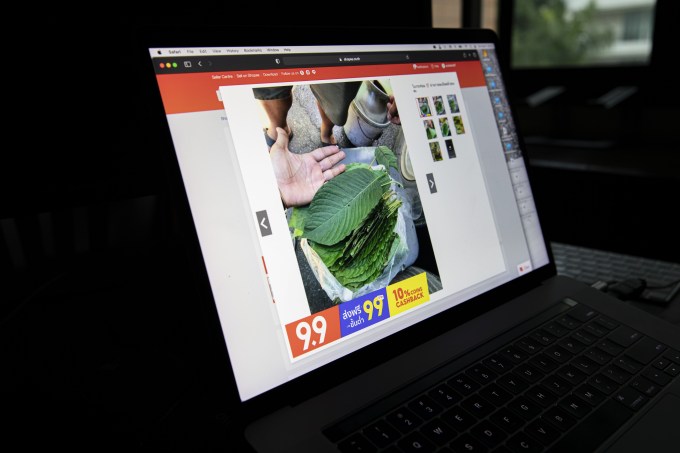| |
| Hello and welcome to Daily Crunch for Monday, March 28, 2022! Alas, I knew this day was coming, and here it is. Christine and Haje are taking over my bits of Daily Crunch from here on out, though I will be back occasionally to fill in when they are on break. Not that I am leaving TechCrunch. Not a bit of it. I'm off to work on TechCrunch+ as my main project, so am leaving you in their very capable hands. As an addendum, Walter will keep writing the TechCrunch+ section, which I am very thankful for. It's been a super huge treat to write for you here for so many months. Hugs, and good luck! — Alex | |  Image Credits: Andre Malerba / Bloomberg / Getty Images | | |
The TechCrunch Top 3 - Sea's Shopee closes India operations: Singapore's Sea is closing down its Shopee e-commerce business in India, but not for the reason you may think. While the announcement follows India's decision to ban Sea's popular title "Free Fire" in the country last month, TechCrunch reports that the company is insisting the reason is "global market uncertainties." The Shopee site was not even a year old.
- Apple wins an Oscar: If you watched the Oscars last night, you surely walked away with one takeaway: that AppleTV+ was the first streaming service to win best picture. Nothing else from the event stood out at all, no sir. Nothing. There are no tweets, takes, or other content discussing any other Oscar happenings. Just that Apple beat Netflix to the pinnacle of Oscar-dom.
- Is the startup slowdown here? We are a few days removed from a deluge of Q1 2021 startup data, but there are some vibrations that we can feel indicating that, yes, the funding market is slowing down. A lot? It's too soon to say. Even more, a slowdown from all-time records doesn't indicate a correction, let alone a startup recession. There's still money flowing, and funds that raised huge capital pools still have to allocate it, slowdown or not.
| | | |
| |
Startups and VC Elon Musk may be threatening to spool up his own social media platform, but Amanda today eloquently argues why it's too early to whine about it on Twitter. "When it comes to Musk actually following through on his wacky Twitter ideas, his track record isn't great," she drily concludes. It looks like French accelerator The Family is going through a bitter family feud, suing one of its co-founders for alleged forgery and "diverting €3 million that was supposed to be invested in several startups" Oh, and don't miss Natasha's Startups Weekly newsletter, where, this week, she's digging into how we're trying to re-invent startup accelerators again and again. | | | |
| Employees are hired to do one specific job, which is why even early-stage startups can become siloed. Companies that find ways to integrate their sales flow and customer success operations have an advantage, writes Erol Toker, founder and CEO of Truly.co. “Optimizing your unique path to better connect with customers requires having a cross-discipline team that's focused solely on that objective and sees the client as their guiding star,” Toker says. “We call that RevOps." (TechCrunch+ is our membership program, which helps founders and startup teams get ahead. You can sign up here.) Read More | |  Image Credits: malamus-UK / Getty Images | | |
Big Tech Inc. - Pinterest adds $1.2M to its creator fund: Compiling a creator fund is a move that platforms make to engender more users to fashion stuff for their website or app. That's the basics. Pinterest has a smaller creator fund than some rivals, but it has had a welcome focus on getting money to underrepresented folks. TechCrunch reports that the former startup has earmarked an "additional $1.2 million in a combination of cash grants, ad credits and other creator resources for underrepresented groups." More of this, please.
- Spotify makes finding new podcasts easier: Spotify is in the news a bit at the moment, rolling out a new podcast discovery tool – tied to its $50 million acquisition of Podz last summer – and shutting down its services in Russia over the country's draconian "false news" laws, which bans takes on Russia's brutal invasion of Ukraine that contradict Russian narratives.
- Apple's Netherlands fine reaches max: Not sure if Apple is sighing in relief as its penalty fines, following an antitrust order about payment technology for dating apps, reached the maximum of $55 million. This is after Apple adjusted its most recent offer, with TechCrunch reporting the amended proposal "should result in definitive conditions for dating-app providers." The company could face more fines if regulators don't agree.
- SpaceX halts manufacture of Crew Dragon capsules: For those of you worried that SpaceX was going to continue to make new Crew Dragon capsules, you need not fear. Instead, the company says four is enough and will concentrate on refurbishing its current fleet, which we report is "the only reusable vehicle used by NASA to shuttle astronauts to and from ISS."
- PayPal's Happy Returns service now free: PayPal Checkout merchants can now take advantage of the Happy Returns return and exchange portal software for free. Ulta Beauty is spearheading the move by rolling out Return Bars at its 1,300 locations. Since PayPal's 2021 acquisition of the software and logistics service, the number of Return Bars has grown to over 5,000.
- TikTok testing a feature so you never lose a video again: Sometimes you are just not ready to watch a video, but when you go to find it, you can't. This has been such a problem that users have posted their own workarounds. Well, TikTok hears you and is now testing a "watch history" feature for your "For You" page so you can recover any of the antics you missed.
| | | |
| |
Newest Jobs from Crunchboard | | | | |
| |
| |







